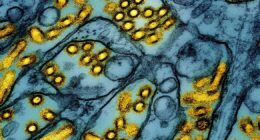
A scarred and damaged liver will have trouble rejuvenating itself, meaning the person affected will be at risk of liver failure. Here are the warning signs to look out for.
According to the British Liver Trust, one of the places where the signs of severe fatty liver disease will turn up is in the toilet bowel.
Melena might occur, which is the term to describe dark black tarry faeces.
This may be a sign of internal bleeding, which is a medical emergency – especially if it’s accompanied by vomiting blood.
Other warning signs that require immediate medical assistance include:
- Yellowness of the eyes and skin (jaundice)
- Bruising easily
- Swelling of the lower tummy area (ascites)
- Periods of confusion or poor memory (encephalopathy)
- Itching skin (pruritus)
What causes fatty liver disease?
Too much fat in the liver is caused by the build-up go fats called triglycerides.
The cholesterol charity Heart UK explained: “Triglycerides are a combination of three fatty acids or fats (i.e. saturated fat, unsaturated fat or both) combined with glycerol, a form of glucose.”
Triglycerides are people’s “main source of energy” supplied by the liver and diet.
Meat, dairy products, cooking fats and oils all contain triglycerides, and when ingested, triglycerides are absorbed by the intestines.
From there, the triglyceride particles are packaged into lipoproteins which are carried to tissues that need energy.
READ RELATED: Coronavirus: Trump slams 'China-centric' World Health Organization
Alternatively, if no tissues need any energy at the time, the triglycerides are stored away to be accessed when needed.
Triglyceride levels are usually checked alongside cholesterol levels in a blood sample.
The UK’s national guidelines recommend a non-fasting triglyceride level below 2.3mmol/L.
If the doctor has asked you to fast before your blood test, the triglyceride level should be below 1.7mmol/L.
There are various lifestyle factors that increase the levels of triglycerides in somebody’s body (and liver).
Most notably, a sedentary lifestyle that involves sitting down for most of the day can lead to a build up of triglycerides.
Furthermore, a diet high in saturated fats and added sugars will make matters worse.
“This also includes alcohol,” said Heart UK, who noted that some people “may be very sensitive to even small amounts that can significantly increase their triglyceride levels”.
Medical conditions may contribute to high triglyceride levels too, including kidney disease, gout, and an underactive thyroid.
Source: Daily Express










